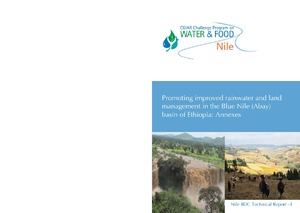Location
Vision, mission and strategy
ILRI's strategy 2013-2022 was approved in December 2012. It emerged from a wide processof consultation and engagement.
ILRI envisions... a world where all people have access to enough food and livelihood options to fulfil their potential.
ILRI’s mission is... to improve food and nutritional security and to reduce poverty in developing countries through research for efficient, safe and sustainable use of livestock—ensuring better lives through livestock.
ILRI’s three strategic objectives are:
- with partners, to develop, test, adapt and promote science-based practices that—being sustainable and scalable—achieve better lives through livestock.
- with partners,to provide compelling scientific evidence in ways that persuade decision-makers—from farms to boardrooms and parliaments—that smarter policies and bigger livestock investments can deliver significant socio-economic, health and environmental dividends to both poor nations and households.
- with partners,to increase capacity among ILRI’s key stakeholders to make better use of livestock science and investments for better lives through livestock.
This is ILRI’s second ten-year strategy. It incorporates a number of changes, many based on learning from the previous strategy (2000–2010, initially produced in 2000 and modified in 2002), an interim strategy (2011–2012) and an assessment of the external and internal environments in which the institute operates.
Members:
Resources
Displaying 651 - 655 of 1152Pastoralists in Kenya and Sudan discover new markets for camels
Speaking in the margins of a recent conference on the future of pastoralism in Africa, Hussein Makmoud from Pwani University College in Kenya talks abut the growing trade in camels in northern Kenya and southern Sudan and how these new markets are contributing to pastoralist livelihoods in the regions. The Addis Ababa conference (21-23 March 2011) was organized by the Future Agricultures Consortium with Tufts University.
Pastoral systems and cultures in transition
Jan de Leeuw from ILRI reflects on the recent conference in Addis Ababa on the future of pastoralism in Africa. He concludes that pastoral systems in Africa are very much in transition. He notes that external influences on pastoralism (education, religion, land rights etc) are much more visible than in the past; the "full mobility" pastoralism that we knew is changing.




